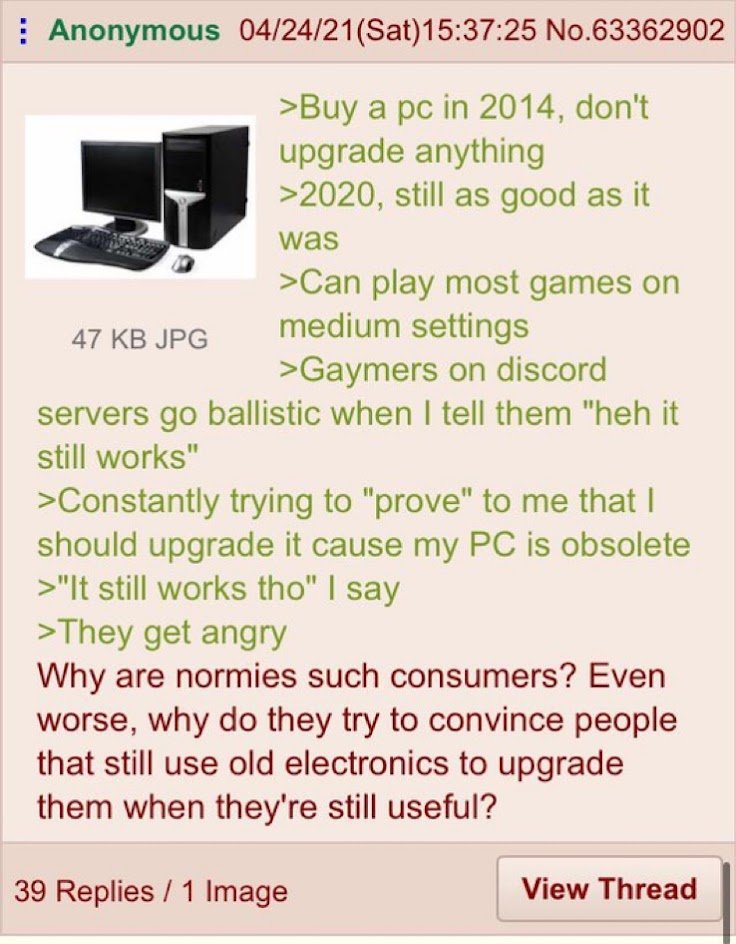this post was submitted on 05 Jan 2025
1045 points (98.3% liked)
Greentext
4753 readers
1601 users here now
This is a place to share greentexts and witness the confounding life of Anon. If you're new to the Greentext community, think of it as a sort of zoo with Anon as the main attraction.
Be warned:
- Anon is often crazy.
- Anon is often depressed.
- Anon frequently shares thoughts that are immature, offensive, or incomprehensible.
If you find yourself getting angry (or god forbid, agreeing) with something Anon has said, you might be doing it wrong.
founded 1 year ago
MODERATORS
you are viewing a single comment's thread
view the rest of the comments
view the rest of the comments

Well it doesn't, again, 2012, gave errors and doesn't run, not performance, idk what else to say except maybe to ask if you have tested this yourself
Then it was an software problem. It can't be the CPU. unless you were using something very old. maybe the problem got solved when you reinstalled the system after you got your new CPU.
I didn't reinstall the OS after getting the new CPU, but had done so multiple times before that.
You're welcome to elaborate on your reasoning for this but I get the impression you haven't tested it yourself, and I am saying, based on my experience, that you are wrong about it. Why exactly you're wrong, I don't know, but it's wrong.
My point is this: someone with 10+ year old hardware should not be expecting to be able to run most games on linux because it likely won't work. Something like that is the cutoff, not 20+ years. If you're not yourself playing games on such a system you shouldn't be advising people otherwise, because you don't know.
You were claiming that some libraries had limited support for CPUs from 2012, which is simple said absolute and utter nonsense.
You are also trying to pin Vulcan problems on CPUs. Which is nonsense as well, since Vulkan has absolutely nothing to do with CPUs since it is a graphics API using the GPU. The only thing that may be is that you were using the integrated GPU built in your CPU, which was not compatible with Vulkan instead of using your dedicated GPU.
In that case, it could explain why changing the CPU fixed the problem, but it was actually never a problem of the CPU itself but a configuration error on your part.
And as said, Wine will run on absolutely anything that came after a Pentium III, so it is very much impossible that your CPU that was from 2012 could not run Wine. But it would be of course very helpful if you would actually tell us what CPU you had.
And yes, i tested it. My old CPU was a Phenom 2 from 2010 and Wine ran just fine with it and still does . And i very clearly gave you the reason in my first post. Which is Wine requiring SSE2.
Man, i even can play some older games with Wine on my Dell XPS M1330 Laptop which came out in 2007. That thing runs an ancient Dual-Core. This needs some tinkering though.
Well ok, I apologize as that was bullshit, that stuff in particular I'm less confident about and is mostly just a guess based on vague memories. I also have an older laptop from the same era with linux that also won't run games, and now that I think about it I might have been getting things mixed up with that re the Vulkan errors, where that laptop also has an older graphics card.
What isn't a guess is that I tried many things over the years with the idea that it could be a software issue, most games did not work with errors, until the CPU upgrade after which games I've tried work with steam/proton. The specific cause is unknown to me. But since I spent so much time on it, and because I had similar issues with that other laptop I mentioned, I feel confident this is a general problem of older hardware and Linux gaming.
I still have it somewhere, I will check. It says AMD Athlon X4, and that it's from 2011.
First of all, I'm saying there's problems running most games, especially modern games, not that Wine doesn't run at all, it did. I was mostly trying with proton/lutris since Wine by itself needs more tinkering. Second, it's flawed logic to point to a compatibility issue that exists with very old hardware and say that because that particular compatibility issue would not apply, that no issue can exist. A case that no issue exists would need way more than that. How can you be sure that there are no dependencies in the software used to make games compatible, on CPU features introduced more recently?
This being possible has of course been the case for a very long time. What hasn't is, a large portion of modern games being playable on linux with minimal tinkering, which is a recent development. But I did not have that experience, until I got new hardware, and I think that's also how it would go for other people.